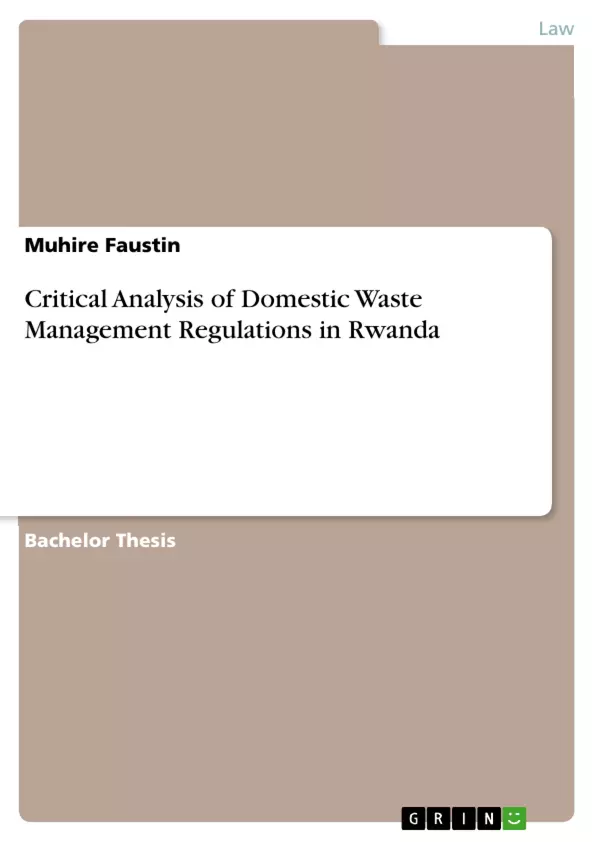
Critical Analysis of Domestic Waste Management Regulations in Rwanda
Bachelorarbeit, 2022
69 Seiten, Note: 80
Leseprobe
Inhaltsverzeichnis (Table of Contents)
-
Introduction
- Background of the Study
- Statement of the Problem
- Objectives of the Study
- Research Questions
- Methodology
- Scope and Limitations of the Study
- Organization of the Study
-
Literature Review
- Definition and Concept of Domestic Waste
- Types of Domestic Waste
- Impact of Domestic Waste on Human Health and Environment
- International Best Practices in Domestic Waste Management
- Domestic Waste Management Regulation in Rwanda
-
Analysis of Domestic Waste Management Regulation in Rwanda
- Legal Framework Governing Domestic Waste Management in Rwanda
- The Effectiveness of Existing Environmental Laws in Protecting Human Health and Environment
- Standards Established by Rwandan Environmental Laws
- Processes Followed from Collection to Disposal of Domestic Waste
- Role of Different Institutions Involved in Domestic Waste Management
-
Lessons from International Best Practices
- Domestic Waste Management in South Africa
- Comparative Analysis of Rwandan and South African Legislation
- Recommendations and Conclusion
Zielsetzung und Themenschwerpunkte (Objectives and Key Themes)
This study aims to critically analyze the effectiveness of domestic waste management regulations in Rwanda and identify areas for improvement. The research explores the existing legal framework, examines the current processes followed from collection to disposal, and assesses the roles of different institutions involved in domestic waste management.
- The effectiveness of existing environmental laws in protecting human health and the environment from the negative effects of domestic waste.
- The adequacy of standards established by Rwandan environmental laws for domestic waste management.
- The effectiveness of current processes followed for domestic waste management, from collection to disposal.
- The roles and efficiency of different institutions involved in domestic waste management in Rwanda.
- Lessons learned from international best practices in domestic waste management.
Zusammenfassung der Kapitel (Chapter Summaries)
The introduction chapter provides background information on the problem of domestic waste management in Rwanda, outlining the study's objectives, methodology, and scope. The literature review delves into the definition and types of domestic waste, explores its impact on human health and the environment, and examines international best practices in waste management, including existing regulations in Rwanda. The subsequent chapter analyzes the legal framework governing domestic waste management in Rwanda, evaluating the effectiveness of existing laws, the adequacy of established standards, and the processes followed for waste collection and disposal. It also examines the roles and efficiency of different institutions involved in waste management.
The final chapter examines lessons learned from international best practices, particularly the domestic waste management system in South Africa, comparing it to the Rwandan system and highlighting areas where improvements can be made. The conclusion summarizes the findings of the study and provides recommendations for enhancing domestic waste management regulation in Rwanda.
Schlüsselwörter (Keywords)
This research centers around the critical analysis of domestic waste management regulations in Rwanda. Key themes include environmental law, domestic waste management, human health, environmental protection, legal framework, institutional roles, international best practices, and legislative reform. The study aims to provide insights into the current state of domestic waste management in Rwanda and offer recommendations for improving its effectiveness, with particular emphasis on lessons learned from countries like South Africa with advanced legislation in this area.
Frequently Asked Questions
What is the main problem with waste management in Rwanda?
Large amounts of domestic waste are disposed of inappropriately in villages, forests, and rivers, posing risks to human health and the environment.
Are Rwanda's environmental laws effective for domestic waste?
The study reveals that the existing legal framework does not regulate the management of domestic waste effectively and lacks sufficient standards.
What institutions are involved in waste management in Rwanda?
Various institutions intervene, but the research highlights their limited role and inefficiency in managing the collection and disposal process.
What lessons can Rwanda learn from South Africa?
South Africa has advanced legislation that could serve as a model for Rwanda to improve its own waste management regulations and institutional roles.
What are the recommendations of the study?
The study suggests legislative reform, establishing clearer standards, and improving the efficiency of institutions involved in the waste disposal chain.
Details
- Titel
- Critical Analysis of Domestic Waste Management Regulations in Rwanda
- Hochschule
- University of Rwanda (University of Rwanda)
- Veranstaltung
- Law
- Note
- 80
- Autor
- Muhire Faustin (Autor:in)
- Erscheinungsjahr
- 2022
- Seiten
- 69
- Katalognummer
- V1252955
- ISBN (Buch)
- 9783346688484
- Sprache
- Englisch
- Schlagworte
- RURA WHO
- Produktsicherheit
- GRIN Publishing GmbH
- Preis (Ebook)
- US$ 31,99
- Preis (Book)
- US$ 45,99
- Arbeit zitieren
- Muhire Faustin (Autor:in), 2022, Critical Analysis of Domestic Waste Management Regulations in Rwanda, München, Page::Imprint:: GRINVerlagOHG, https://www.diplomarbeiten24.de/document/1252955
- Autor werden
- Ihre Optionen
- Vertriebskanäle
- Premium Services
- Autorenprofil
- Textarten und Formate
- Services für Verlage, Hochschulen, Unternehmen

- © GRIN Publishing GmbH.
- Alle Inhalte urheberrechtlich geschützt. Kopieren und verbreiten untersagt.
- info@grin.com
- AGB
- Open Publishing
Der GRIN Verlag hat sich seit 1998 auf die Veröffentlichung akademischer eBooks und Bücher spezialisiert. Der GRIN Verlag steht damit als erstes Unternehmen für User Generated Quality Content. Die Verlagsseiten GRIN.com, Hausarbeiten.de und Diplomarbeiten24 bieten für Hochschullehrer, Absolventen und Studenten die ideale Plattform, wissenschaftliche Texte wie Hausarbeiten, Referate, Bachelorarbeiten, Masterarbeiten, Diplomarbeiten, Dissertationen und wissenschaftliche Aufsätze einem breiten Publikum zu präsentieren.
Kostenfreie Veröffentlichung: Hausarbeit, Bachelorarbeit, Diplomarbeit, Dissertation, Masterarbeit, Interpretation oder Referat jetzt veröffentlichen!
- GRIN Verlag GmbH
-
- Nymphenburger Str. 86
- 80636
- Munich, Deutschland
- +49 89-550559-0
- +49 89-550559-10
- info@grin.com
-









